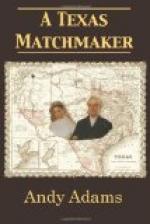One morning just as he was on the point of starting on horseback to the county seat to pay his taxes, a Mexican arrived at the ranch and announced that he had seen a large band of javalina on the border of the chaparral up the river. Uncle Lance had promised his taxes by a certain date, but he was a true sportsman and owned a fine pack of hounds; moreover, the peccary is a migratory animal and does not wait upon the pleasure of the hunter. As I rode out from the corrals to learn what had brought the vaquero with such haste, the old ranchero cried, “Here, Tom, you’ll have to go to the county seat. Buckle this money belt under your shirt, and if you lack enough gold to cover the taxes, you’ll find silver here in my saddle-bags. Blow the horn, boys, and get the guns. Lead the way, Pancho. And say, Tom, better leave the road after crossing the Sordo, and strike through that mesquite country,” he called back as he swung into the saddle and started, leaving me a sixty-mile ride in his stead. His warning to leave the road after crossing the creek was timely, for a ranchman had been robbed by bandits on that road the month before. But I made the ride in safety before sunset, paying the taxes, amounting to over a thousand dollars.
During all our acquaintance, extending over a period of twenty years, Lance Lovelace was a constant revelation to me, for he was original in all things. Knowing no precedent, he recognized none which had not the approval of his own conscience. Where others were content to follow, he blazed his own pathways—immaterial to him whether they were followed by others or even noticed. In his business relations and in his own way, he was exact himself and likewise exacting of others. Some there are who might criticise him for an episode which occurred about four years after my advent at Las Palomas.
Mr. Whitley Booth, a younger man and a brother-in-law of the old ranchero by his first wife, rode into the ranch one evening, evidently on important business. He was not a frequent caller, for he was also a ranchman, living about forty miles north and west on the Frio River, but was in the habit of bringing his family down to the Nueces about twice a year for a visit of from ten days to two weeks’ duration. But this time, though we had been expecting the family for some little time, he came alone, remained over night, and at breakfast ordered his horse, as if expecting to return at once. The two ranchmen were holding a conference in the sitting-room when a Mexican boy came to me at the corrals and said I was wanted in the house. On my presenting myself, my employer said: “Tom, I want you as a witness to a business transaction. I’m lending Whit, here, a thousand dollars, and as we have never taken any notes between us, I merely want you as a witness. Go into my room, please, and bring out, from under my bed, one of those largest bags of silver.”




